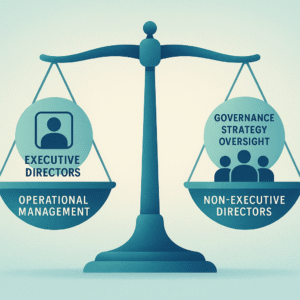In the complex world of corporate governance, one of the most intriguing questions is whether non-executive directors (NEDs) truly have control within an organisation. While executive directors manage the day-to-day operations, non-executive directors serve a different, yet equally critical role — offering independent oversight, guidance, and strategic direction. Their influence lies not in managing the business directly but in ensuring that management decisions align with the company’s long-term goals and stakeholder interests.
This article takes an in-depth look at the role of non-executive directors, their responsibilities, their differences from executive directors, and how they impact corporate strategy and accountability.
What is the Role of Non-Executive Directors

Non-executive directors are integral members of a company’s board who are not part of its daily management team. Their primary purpose is to bring an objective, independent view to the boardroom, balancing executive enthusiasm with prudent oversight. While they do not engage in operational activities, they play a vital role in influencing strategic decisions and ensuring strong corporate governance.
Guiding Policy Making and Planning
One of the key responsibilities of non-executive directors is to participate in developing the company’s strategic direction. They actively engage in policy formulation and planning sessions to provide insights based on their professional expertise and external experience. Because they are independent of internal operations, their viewpoints are often more balanced, helping executive directors see beyond internal constraints.
In strategic planning, non-executive directors question assumptions, challenge growth projections, and ensure that corporate policies align with the long-term interests of shareholders and other stakeholders. Their involvement ensures that decisions are made with clarity and accountability, helping prevent impulsive or biased decision-making.
Providing Independent Advice
A crucial function of non-executive directors is to offer independent and constructive advice to the executive team. Their independence allows them to evaluate company performance, financial reports, and business plans with objectivity. This impartiality enables them to question management decisions without the pressure of internal politics.
Through open and transparent communication, non-executive directors help executive directors explore multiple solutions to complex issues. Their guidance often acts as a safeguard against groupthink, ensuring that decisions undergo adequate scrutiny before implementation.
Acting in the Interest of Corporate Stakeholders
Another significant responsibility of non-executive directors is to protect the interests of shareholders, employees, customers, and other stakeholders. They ensure that executive management does not pursue short-term gains at the expense of long-term sustainability. Non-executive directors also assess whether company decisions uphold ethical standards and align with the organisation’s mission and values.
Their independent judgment ensures that the board maintains a balanced focus between profitability, sustainability, and compliance. In essence, they represent the conscience of the company — ensuring fairness, transparency, and integrity in governance.
Non-Executive Directors vs Executive Directors

The distinction between non-executive and executive directors lies in their responsibilities and day-to-day involvement in the company. Executive directors are full-time employees responsible for running the organisation. They make operational decisions, oversee departments, manage teams, and ensure that strategic plans are executed efficiently.
Non-executive directors, on the other hand, do not handle daily operations. Instead, they focus on governance, oversight, and ensuring that management actions align with the company’s long-term objectives. They attend board meetings, review company performance, and provide critical input on key matters like risk management, compliance, and corporate culture.
While executive directors are insiders, non-executive directors act as external advisors. Their outsider perspective helps maintain a balance of power on the board and ensures that executive decisions are subject to rigorous review. Both roles are essential — executives drive growth, while non-executives ensure that growth occurs responsibly and sustainably.
Responsibilities and Duties of Non-Executive Directors
Non-executive directors carry several crucial responsibilities that contribute to the organisation’s governance, strategy, and overall success. Their duties extend beyond attending meetings — they act as custodians of corporate integrity and accountability.
Contribution to Strategic Decision-Making
Non-executive directors play an essential role in shaping the company’s strategy. Their experience across different sectors allows them to identify emerging opportunities and potential threats. They contribute insights during board discussions, helping executives refine business strategies.
Their involvement ensures that strategic decisions are realistic, measurable, and aligned with the organisation’s goals. By providing diverse perspectives, they help the company remain innovative yet prudent in its strategic pursuits.
Reviewing and Monitoring Financial Performance
Financial oversight is another vital area where non-executive directors add value. They analyse budgets, forecasts, and financial reports to ensure accuracy and transparency. Their independent assessment helps identify irregularities, inefficiencies, or potential risks in financial management.
This oversight strengthens investor confidence by demonstrating that the company’s finances are being managed responsibly. Non-executive directors also ensure that performance targets are realistic and that resources are allocated effectively to achieve long-term growth.
Guidance on Risk Management
In today’s volatile business environment, effective risk management is critical. Non-executive directors help develop and oversee risk management frameworks to identify, assess, and mitigate potential threats to the organisation.
Their focus is not only on financial risks but also on operational, reputational, and regulatory challenges. By providing guidance on risk mitigation strategies, they help the company maintain resilience and adapt to changing market conditions.
Service on Board Committees
Non-executive directors often serve on specialised committees such as the audit, remuneration, or nomination committees. These committees handle specific aspects of governance and accountability. For example, audit committees oversee financial reporting and internal controls, while remuneration committees ensure fair and performance-based executive compensation.
Serving on committees allows non-executive directors to apply their expertise in targeted areas and ensure that complex decisions are examined thoroughly before approval.
Ensuring Compliance with Laws and Regulations
A core responsibility of non-executive directors is ensuring that the company operates within the law and complies with all relevant regulations. They must stay updated with the latest legal and corporate governance frameworks.
By monitoring compliance efforts, they help the organisation avoid legal penalties and reputational damage. Their vigilance also reinforces ethical practices and strengthens trust among stakeholders.
Shared Legal Responsibilities with Executive Directors
Non-executive directors share the same legal and fiduciary duties as executive directors. They must act in good faith, exercise due diligence, and always prioritise the company’s best interests.
This shared responsibility means that non-executive directors can be held liable for governance failures or breaches of duty. Therefore, they must stay informed, ask critical questions, and actively participate in decision-making to avoid negligence.
Also Read: A Complete Guide to the UK Expansion Worker Visa for 2025
Hiring and Appointing Non-Executive Directors
The process of appointing non-executive directors involves identifying individuals with the right balance of skills, experience, and independence. Typically, the board of directors or a nomination committee oversees this process.
The Appointment Process
The selection process includes conducting due diligence, reviewing credentials, and ensuring that the candidate can contribute to strategic discussions. Candidates must demonstrate independence, integrity, and a deep understanding of corporate governance principles.
Induction and Training
Once appointed, non-executive directors undergo an induction process to familiarise themselves with the company’s operations, values, and stakeholders. This enables them to contribute meaningfully to board discussions.
In addition, continuous professional development is encouraged. Non-executive directors may participate in training programs on risk management, financial analysis, or emerging governance trends to stay effective in their roles.
Remuneration of Non-Executive Directors
Non-executive directors are compensated for their time and expertise. Their remuneration varies depending on the organisation’s size, sector, and financial capacity. It can be structured as a flat fee, equity-based compensation, or other benefits.
On average, non-executive directors in the UK earn around £40,000 per year. However, the value they bring to a company often exceeds their remuneration, as their oversight helps prevent costly governance failures.
Emphasising Diversity in Appointments
Modern boards increasingly recognise the value of diversity. Appointing directors from different backgrounds — including gender, ethnicity, and professional expertise — enhances decision-making and promotes innovation.
Diverse boards are better equipped to represent stakeholder interests, improve governance standards, and respond to complex challenges with a wider range of perspectives.
Liabilities and Legal Duties of Non-Executive Directors
Non-executive directors carry significant legal and ethical responsibilities. They must comply with statutory duties outlined in corporate governance laws such as the Companies Act 2006.
They are required to:
- Act within their powers and authority.
- Promote the company’s success.
- Exercise independent judgment.
- Avoid conflicts of interest.
- Exercise reasonable care, skill, and diligence.
Failure to meet these obligations can result in legal consequences, including disqualification or personal liability for misconduct. These responsibilities highlight the importance of active participation, informed decision-making, and ongoing engagement in governance matters.
Sector-specific regulations may also impose additional duties, particularly in industries like finance, healthcare, or energy. Non-executive directors must therefore remain vigilant and proactive in understanding the unique compliance requirements of their sector.
The Importance of Compliance for Non-Executive Directors
Compliance is not merely a legal formality — it is a cornerstone of effective governance. Non-executive directors must ensure that the organisation operates transparently, ethically, and in accordance with the law.
By promoting compliance, they protect the company’s reputation, build stakeholder trust, and prevent potential legal disputes. Moreover, adherence to governance standards reflects the company’s commitment to accountability and sustainability.
Do Non-Executive Directors Have Control?
While non-executive directors do not control the daily operations of a business, their influence is profound. They control through oversight, ensuring that the company’s leaders make decisions responsibly and ethically.
Their control lies in their ability to:
- Approve or reject key strategic decisions.
- Challenge management assumptions.
- Oversee risk and compliance frameworks.
- Monitor executive performance.
Thus, non-executive directors exert indirect but meaningful control over the organisation’s direction and governance. Their authority is derived not from managing people or operations but from shaping corporate behaviour, ensuring transparency, and protecting stakeholder interests.
In many ways, this oversight-based control is more powerful than direct management because it sets the tone for integrity, accountability, and strategic discipline across the organisation.
Conclusion
Non-executive directors are the guardians of corporate governance. While they do not engage in daily management, their independent oversight ensures that a company remains transparent, ethical, and strategically sound. Through their diverse expertise, they contribute to policy development, risk management, financial oversight, and compliance.
Their role is not to control but to guide — to ensure that executives act responsibly and in the best interests of the company and its stakeholders. In doing so, non-executive directors uphold the values of good governance and contribute significantly to a company’s long-term success.
Ultimately, the presence of skilled, ethical, and independent non-executive directors strengthens the entire governance framework. They remind businesses that true control is not about managing operations but about maintaining integrity, accountability, and trust at every level of the organisation.

